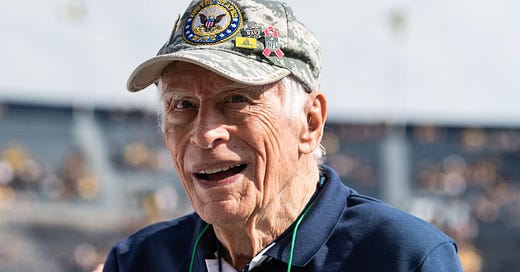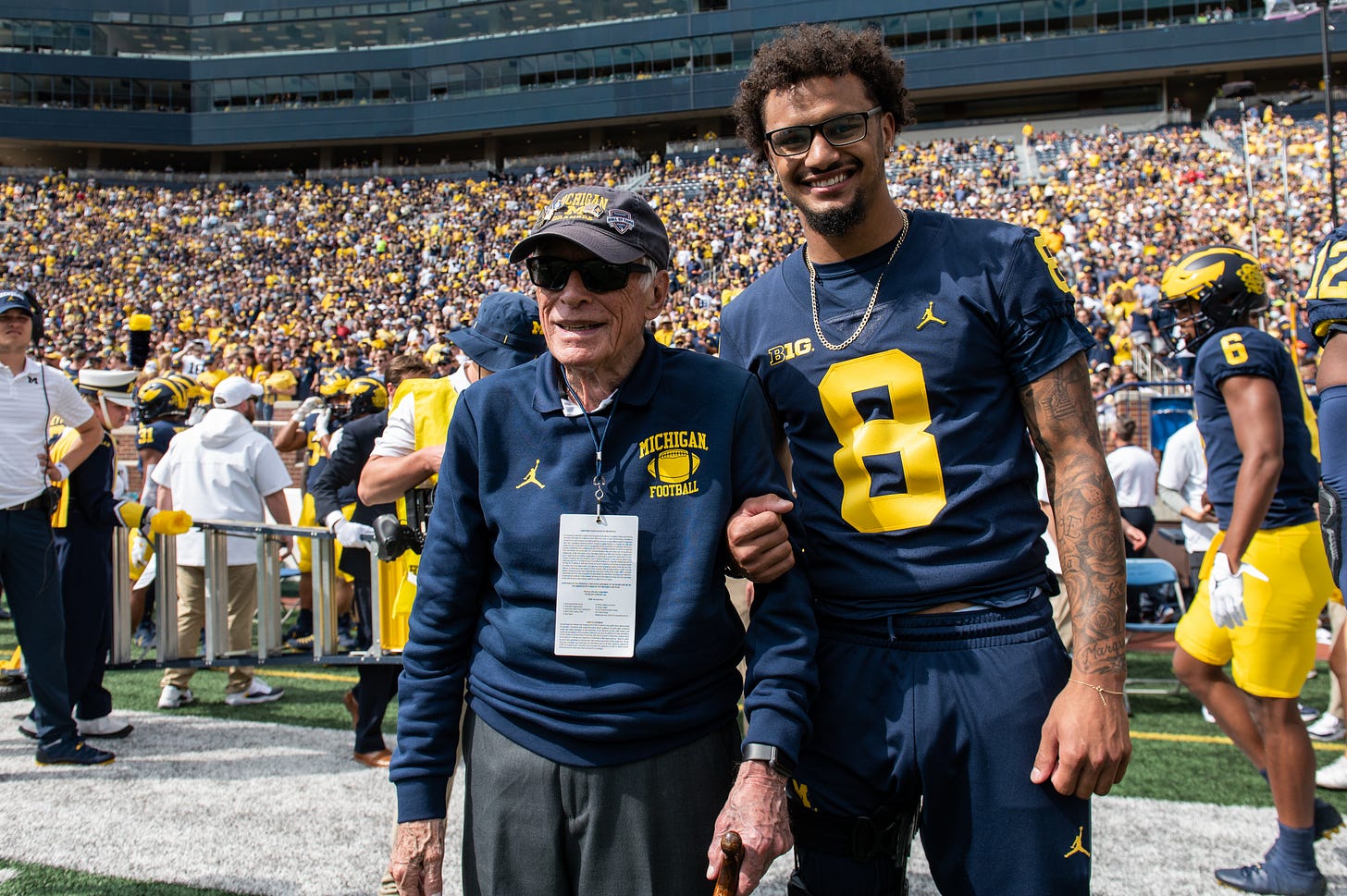Remembering Jerry Green
The long-time Detroit News columnist, who had a special place in his heart for the Wolverines, is recalled as a great friend, conversationalist and storyteller
Jerry Green, sporting his classic smile, on the field at Michigan Stadium prior to a game with Northern Illinois in 2021.
Photo Courtesy of University of Michigan Photography
Former Detroit News columnist Jerry Green is escorted to midfield by Wolverine co-captain Ronnie Bell. Green was an honorary captain by designation of Michigan coach Jim Harbaugh for the 2021 game with Northern Illinois.
Photo Courtesy of University of Michigan Photography
By Steve Kornacki
Jerry Green was a treasure for readers, and a pleasure to share conversations with.
And you should know that, while maintaining objectivity, he truly loved the University of Michigan.
Coach Jim Harbaugh thought the world of Jerry, and had him join his team’s captains in the coin flip before a game in 2021 as an honorary captain. Ronnie Bell, who was out with an injury, escorted him to the 50-yard line.
Jerry covered Harbaugh’s playing and coaching career in both college and the NFL, and also formed a special friendship with another Michigan quarterback, Tom Brady, while covering all those Super Bowls they both were part of.
Jerry, you should know, was part of a small pack of writers who sat poolside in Miami with New York Jets quarterback Joe Namath while he predicted that huge upset win over the Baltimore Colts in what became known as Super Bowl III.
He went way back with the Wolverines, and enjoyed telling me about how, as an Associated Press reporter based in Ann Arbor in the 1950s, he would attend Wolverines football practices daily and banter with Coach Bennie Oosterbaan afterward.
Those were simpler times, when reporters and the athletes and coaches they covered got to know one another and become friends.
However, those also were more critical times, when reporters and columnists truly held those they covered accountable for things. What you found was that if you had mutual respect, those you covered would respect your opinion – even if they might not agree with it.
Jerry went to Brown with a quarterback named Joe Paterno, and now they’re probably up in heaven recalling their long run together.
One Friday night before a Michigan-Penn State football game in the 1990s, Jerry and I were having dinner at a classic, old-town restaurant near campus in State College. Paterno and Nittany Lions sports information director Budd Thalman were dining nearby, and Joe just had to come over and join Jerry. They had the kind of conversation two legends have with one another – praising the other while also playfully cutting on one another, but always smiling.
Jerry saw it all.
He covered the Detroit Tigers, and knew both the 1968 and 1984 World Series champions intimately. Al Kaline and Sparky Anderson deeply admired him.
He loved the NFL and covered the Detroit Lions, and is best known for being the only reporter to cover the first 56 Super Bowls. When he didn’t attend the most recent one, breaking the string, it was because of declining health.
Jerry died Friday, at 94, and when I saw the news streaming across the bottom of a TV screen while watching a game, my eyes welled with tears. And then all of those great times together came back to me, prompting smiles.
He had a column plea back in 1973, when he was a star columnist at the Detroit News, for readers to voice their opinion on this new designated hitter rule the American League was going to use.
I was a junior at Trenton (Mich.) High, writing for the Trojan Trumpet, when I mailed Jerry my thoughts.
And he ran them!
Man alive, I still get goose bumps recalling how special that was.
A few years later, I was the sports editor and columnist of the Eastern Echo at Eastern Michigan University. Basketball coach Ray Scott, the former NBA Coach of the Year with the Detroit Pistons, invited Jerry and Detroit News reporter Mike O’Hara – whom I’m also privileged to call friend – to coach the Green and White teams in a scrimmage.
Ray deeply admired both men, and you could feel the love they all had for one another, and how much fun they had being together.
I interviewed Jerry after the game, writing a column about him and what it was like being a big-city columnist. He gave me all the time I wanted and was so pleasant, so accommodating.
Fast forward about 40 years and my son, Derek Kornacki, got to have that same kind of experience with Jerry. We write for this newsletter and also co-authored a book for Skyhorse Publishing in New York City, “Miracle Moments in Michigan Wolverines Football History.” Derek requested time with Jerry, a master historian on the program, to get background material.
Derek recalled that:
“I called him up thinking that we’d talk for 20-30 minutes. He’d tell a couple funny stories about Bo Schembechler, and I’d get a few solid quotes and anecdotes that I’d be able to plug into a couple chapters, and that would pretty much be that. Which would’ve been more than enough. But we ended up talking for nearly two hours.
“There were hilarious Bo stories aplenty, but he shared so much more than that. He talked about what a fascinating person [Ohio State coach] Woody Hayes was. He said that Woody was entirely different from his public persona. That he knew him to be a thoughtful and kind man. Also saying that Hayes was one of the most well-read persons he’d ever come across.
“That led to us discussing literature and some of our respective favorite books. We covered a lot of topics that day, and when I hung up the phone with him, I felt like we’d established a friendship. I felt honored that someone of his stature in the business of journalism would treat me as a peer. His generosity and candor made an indelible impression on me.”
Jerry loved nothing better than a good conversation.
Derek continued, “He was whip-smart, even in his late 80s, and could’ve assumed the role of the wise old sage, coming down from the mountain top with his tablets of truth. But he was not even remotely like that at all. He treated me like someone he’d been working alongside of for 20 years.
“Jerry set the bar for sports journalism in Detroit for decades. But he didn’t get there on writing ability and hard work alone. He got there by being a person of integrity, and a person with an insatiable curiosity for his fellow man. It’s generally difficult to tell a lot about a person based on one conversation, but in Jerry’s case, it wasn’t. Thank you, Jerry. Rest easy.”
Indeed.
Jerry will always be with us, though, because he’s one of those people you will always remember for the special times together and the great stories he wrote.
He was, more than anything, a great storyteller.
So, when he called two years ago to compliment me on the freelance story I wrote for the Detroit News on the 50th anniversary of Detroit Lions receiver Chuck Hughes dying of a heart attack during a game with the Chicago Bears, it meant more to me than any award could.
“I wished I had written that story,” Jerry told me.
Wow.
Jerry was close to those Lions and Hughes, and covered that tragic story better than anyone else 50 years ago. I know. I read all of them while researching the Hughes story. He went onto share stories about quarterback Greg Landry and Heisman Trophy-winning running back Steve Owens, who were in a great photo with Hughes that Sharon Hughes, his widow, shared with me.
They were hoisting beers at a party in that photo to celebrate a big win in a playoff season, and Jerry talked about one of the stars of that team going out and buying some beer and inviting the reporters to the party, too.
I updated him on how Sharon and her son, Shane, were doing back in Texas, where Sharon and Chuck met as students at what is now called the University of Texas at El Paso.
Jerry was tickled that I was writing regularly for his paper – the paper he never completely stopped writing for. He continued covering Super Bowls and writing about those personalities he covered over the years, sharing his special memories about them, usually after they died.
And so now I’m writing about Jerry.
And with the same intentions he had. I wanted to let you know what made him special, what made him my friend, what made him a storyteller we all aspired to come close to approaching.






Jerry was one of the last links to a Golden Era of sports coverage in Detroit and Michigan.
I like to tell the story of how, when Jerry heard me say that his book “Year of the Tiger” was one of my prized possessions, he asked me to bring it to him in the press box before a Michigan football game. He autographed it for me and shared some backstories to some of the things he wrote about. I wasn’t even a journalist--just a quote runner. But he was exceptionally gracious and generous with his time. He was the ultimate professional and gentleman.